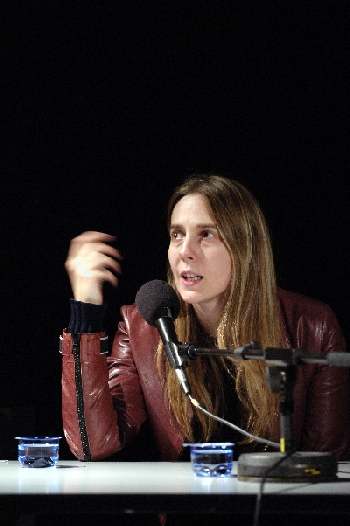
Born in 1970 in London (United Kingdom of Great Britain and Northern Ireland)
Lives and works in (Belgium )
Bibliographie
Liste expositions
 | BritishNationality Born in 1970 in London (United Kingdom of Great Britain and Northern Ireland) Lives and works in (Belgium ) | Biographie Bibliographie Liste expositions |
Laura Waddington studied English literature at Cambridge University. She then lived in New York for seven years, where she worked in independent and experimental cinema and directed her first short films.
She very quickly adopted the digital camera, which she sees as an alternative mode of production, providing technical autonomy and facilitating postproduction work. She directs a lot of commissions, videos for choreographers and personalities from the art or fashion worlds. In her more personal videos, she combines documentary and fiction and deals with displacement, from travel to seasonal migration, and with the absence of real freedom for people, with hidden and impenetrable borders. She is interested in men and women at the fringes of society, and strives to show the human beings that we sometimes refuse to recognise in them. The artist’s personal commitment, as well as the aesthetic procedures employed, make her videos closer to the documentary genre. Armed with her camera, she travels to the sites that she wishes to study, she takes her time, bringing back human testimonies from her expeditions. Therefore, these intense films constitute aesthetic and existential experiences.
In 1995, she directed her first video Zone, shot with a hidden camera on a cruise ship, the Queen Elisabeth 2, followed by The Lost Days in 1997, relating the story of a woman travelling across the globe and sending video-letters to a friend. For this work, Laura Waddington, who was living illegally in the United States and was therefore unable to travel, contacted the inhabitants of fifteen different countries through the Internet, asking them to film their city according to a set of specific instructions. She then worked with the images they had sent. This era also marks the start of her collaboration with English composer Simon Fisher Turner.
In 1998, Laura Waddington left New York and lived for some time in Lisbon and Barcelona before moving to Paris. Following a commission from the Rotterdam Film Festival based on the “On the Waterfront” project, she directed Cargo (2001), the tale of a journey lasting a whole summer, on a cruise ship that traversed Europe to the Middle East, with a crew of international sailors. She filmed the living conditions of the sailors and how they were received in the various ports of call, but also the passing of time – its altered state – aboard the ship. Furthermore, the artist develops the idea that there is a double life in Europe, on the sidelines, beyond its plotted borders.
Laura Waddington travels in this way throughout Europe, in Kurdistan, and in the Balkans, in search of the itineraries traversed by the exiled people of the world, sometimes in the most dangerous places. Border (2004) is the account of her experience in the woods surrounding the Red Cross camp in Sangatte, in the Pas-de-Calais region, where she lived for several months, hidden away with the Iraqi and Afghan refugees. Here, she clandestinely filmed their desperate attempts to escape the police and cross the Channel tunnel to reach England. With a small video camera, she filmed by night, using car headlights and punctual light sources as her only means of lighting.
In 2006, she spent several months in Amman, in Jordan, where she produced interviews with refugees who had fled the war in Iraq, then remained in Jordan to continue her research in 2008 and 2009.
The work of Laura Waddington has been presented and won awards in many international film, documentary and video festivals, including those of Locarno, Zurich and Rotterdam.
Priscilia Marques
translated by Yves Tixier and Anna Knight